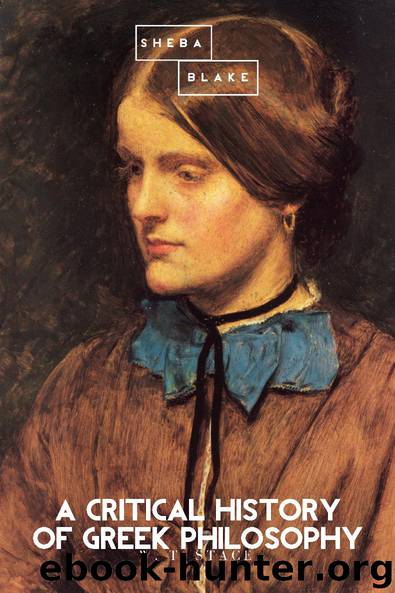A Critical History of Greek Philosophy by W.T. Stace

Author:W.T. Stace [Stace, W.T.]
Language: eng
Format: epub
Publisher: manybooks.net
Sense objects, so far as they are knowable, that is so far as they are more than bare sensations, are so only because the Idea resides in them. And this yields the clue to Plato's teaching regarding the relation of sense objects to the Ideas. The Ideas are, in the first place the cause, that is to say, the ground (not the mechanical cause) of sense-objects. The Ideas are the absolute reality by which individual things must be explained. The being of things flows into them from the Ideas. They are "copies," "imitations," of the Ideas. In so far as they resemble the Idea, they are real; in so far as they differ from it, they are unreal. In general, sense objects are, in Plato's opinion, only very dim, poor and imperfect copies of the Ideas. They are mere shadows, and half-realities. Another expression frequently used by Plato to express this relationship is that of "participation." Things participate in the Ideas. White objects participate in the one whiteness, beautiful objects, in the one beauty. In this way beauty itself is the cause or explanation of beautiful objects, and so of all other Ideas. The Ideas are thus both transcendent and immanent; immanent in so far as they reside in the things of sense, transcendent inasmuch as they have a reality of their own apart from the objects of sense which participate in them. The Idea of man would still be real even if all men were destroyed, and it was real before any man existed, if there ever was such a time. For the Ideas, being timeless, cannot be real now and not then.
Of what kinds of things are there Ideas? That there are moral Ideas, such as Justice, Goodness, and Beauty, Ideas of corporeal things, such as horse, man, tree, star, river, and Ideas of qualities, such as whiteness, heaviness, sweetness, we have already seen. But there are Ideas not only of natural corporeal objects, but likewise of manufactured articles; there are Ideas of beds, tables, clothes. And there are Ideas not only of exalted moral entities, such as Beauty and Justice. There are also the Ideal Ugliness, and the Ideal Injustice. There are even Ideas of the positively nauseating, such as hair, filth, and dirt. This is asserted in the "Parmenides." In that dialogue Plato's teaching is put into the mouth of Parmenides. He questions the young Socrates whether there are Ideas of hair, filth, and dirt. Socrates denies that there can be Ideas of such base things. But Parmenides corrects him, and tells him that, when he has attained the highest philosophy, he will no longer despise such things. Moreover, these Ideas of base things are just as much perfection in their kind as Beauty and Goodness are in theirs. In general, the principle is that there must be an Idea wherever a concept can be formed; that is, wherever there is a class of many things called by one name.
We saw, in treating of
Download
This site does not store any files on its server. We only index and link to content provided by other sites. Please contact the content providers to delete copyright contents if any and email us, we'll remove relevant links or contents immediately.
The remains of the day by Kazuo Ishiguro(8999)
Tools of Titans by Timothy Ferriss(8393)
Giovanni's Room by James Baldwin(7346)
The Black Swan by Nassim Nicholas Taleb(7129)
Inner Engineering: A Yogi's Guide to Joy by Sadhguru(6793)
The Way of Zen by Alan W. Watts(6614)
The Power of Now: A Guide to Spiritual Enlightenment by Eckhart Tolle(5781)
Asking the Right Questions: A Guide to Critical Thinking by M. Neil Browne & Stuart M. Keeley(5775)
The Six Wives Of Henry VIII (WOMEN IN HISTORY) by Fraser Antonia(5515)
Astrophysics for People in a Hurry by Neil DeGrasse Tyson(5189)
Housekeeping by Marilynne Robinson(4447)
12 Rules for Life by Jordan B. Peterson(4304)
Ikigai by Héctor García & Francesc Miralles(4274)
Double Down (Diary of a Wimpy Kid Book 11) by Jeff Kinney(4271)
The Ethical Slut by Janet W. Hardy(4251)
Skin in the Game by Nassim Nicholas Taleb(4248)
The Art of Happiness by The Dalai Lama(4130)
Skin in the Game: Hidden Asymmetries in Daily Life by Nassim Nicholas Taleb(4006)
Walking by Henry David Thoreau(3962)
